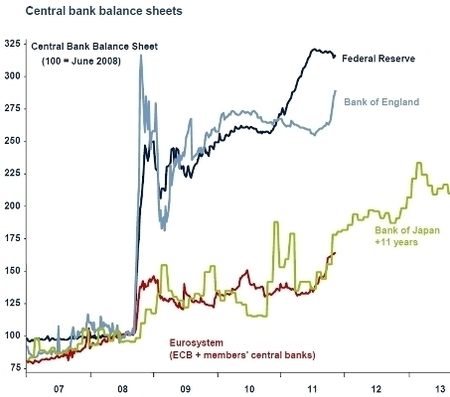"As announced in previous GEABs, in this issue our team presents its anticipations on the changes in the United States for the period 2012-2016. This country, the epicentre of the global systemic crisis and pillar of the international system since 1945, will go through a particularly tragic in its history during these five years.
Already insolvent it will become ungovernable bringing about, for Americans and those who depend on the United States violent and destructive economic, financial, monetary, geopolitical and social shocks. If the United States today is already very different from the "super-power" of 2006, the year the first GEAB was published, announcing the global systemic crisis and the end of the all-powerful US, the changes we anticipate for the 2012-2016 period are even more important, and will radically transform the country's institutional system, its social fabric and its economic and financial weight.
At the same time, every December, we evaluate our anticipations for the year just ended. This exercise, too rarely practiced by the think tanks, experts and media (1) is a tool enabling our subscribers (2) as well as our researchers to verify that our work retains a high added-value and and is in direct contact with reality. This year our score improved slightly and LEAP/E2020 attained an 82% success rate in its anticipations for 2011.
In addition we also detail our recommendations on foreign currencies, gold, stock exchanges and the consequences of the United Kingdom’s marginalization within the EU (3) on the Pound, Gilts and UK debt and we set out some advice on developments of the American institutional system (4).
In this public communiqué we have chosen to present an excerpt from our anticipation on the changes in the United States for the 2012-2016 period.
But before addressing the American case, we wish to review the situation in Europe (5).
From the non-dislocation of Euroland to the dislocation of the United Kingdom
As anticipated by our team, the EU summit in Brussels on 7 and 8 December last has led to two key events:
. the further integration of Euroland with an acceleration and strengthening of budgetary and financial integration and the initiation of a fiscal integration (6). The Eurozone governments, led by Germany, have confirmed their willingness to go right through to the end of this process, unlike all the Anglo-Saxon and Eurosceptic discussions which, for the last two years, predicted that Germany would abandon the Euro. At the same time, they have refused to follow the path of the Fed and the Bank of England by refraining from running the printing press (Quantitative Easing) as long as budgetary discipline is not achieved within Euroland (7). The clear failure of QE in the US as in the UK (8) confirms the relevance of this choice which will allow the issue of Eurobonds at the end of 2012 (9)..."

at http://www.marketoracle.co.uk/Article32204.html
Already insolvent it will become ungovernable bringing about, for Americans and those who depend on the United States violent and destructive economic, financial, monetary, geopolitical and social shocks. If the United States today is already very different from the "super-power" of 2006, the year the first GEAB was published, announcing the global systemic crisis and the end of the all-powerful US, the changes we anticipate for the 2012-2016 period are even more important, and will radically transform the country's institutional system, its social fabric and its economic and financial weight.
At the same time, every December, we evaluate our anticipations for the year just ended. This exercise, too rarely practiced by the think tanks, experts and media (1) is a tool enabling our subscribers (2) as well as our researchers to verify that our work retains a high added-value and and is in direct contact with reality. This year our score improved slightly and LEAP/E2020 attained an 82% success rate in its anticipations for 2011.
In addition we also detail our recommendations on foreign currencies, gold, stock exchanges and the consequences of the United Kingdom’s marginalization within the EU (3) on the Pound, Gilts and UK debt and we set out some advice on developments of the American institutional system (4).
In this public communiqué we have chosen to present an excerpt from our anticipation on the changes in the United States for the 2012-2016 period.
But before addressing the American case, we wish to review the situation in Europe (5).
From the non-dislocation of Euroland to the dislocation of the United Kingdom
As anticipated by our team, the EU summit in Brussels on 7 and 8 December last has led to two key events:
. the further integration of Euroland with an acceleration and strengthening of budgetary and financial integration and the initiation of a fiscal integration (6). The Eurozone governments, led by Germany, have confirmed their willingness to go right through to the end of this process, unlike all the Anglo-Saxon and Eurosceptic discussions which, for the last two years, predicted that Germany would abandon the Euro. At the same time, they have refused to follow the path of the Fed and the Bank of England by refraining from running the printing press (Quantitative Easing) as long as budgetary discipline is not achieved within Euroland (7). The clear failure of QE in the US as in the UK (8) confirms the relevance of this choice which will allow the issue of Eurobonds at the end of 2012 (9)..."

at http://www.marketoracle.co.uk/Article32204.html